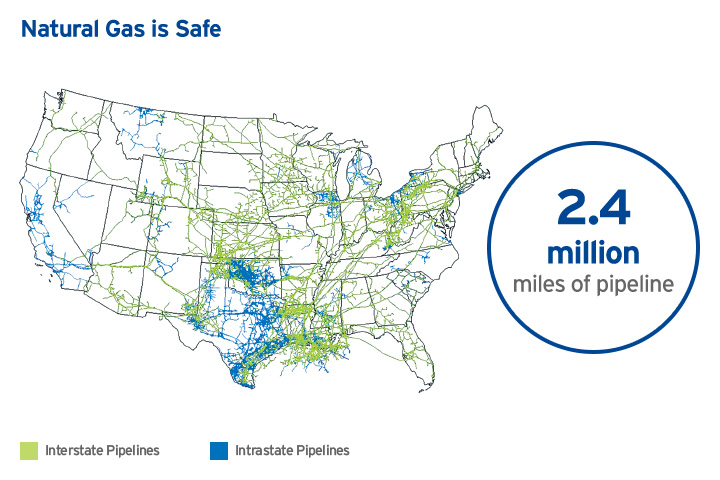Natural gas has the best safety and reliability record of all traditional energy sources. In addition, the dedicated efforts of natural gas utilities over the past three decades have led to an approximately 40% decline in pipeline incidents over the past 10 years.
Typically, natural gas that accidentally escapes in the open will dissipate harmlessly into the air. However, when a gas and air mixture within the flammability range collects in a confined space, it can ignite. Because natural gas in its raw state has no smell or color, we add the "rotten egg" odor to make you aware if natural gas is leaking. If you smell gas1, leave the area immediately and call 1-800-427-2200. We will send a trained technician to investigate. Learn more about natural gas safety.
[1] Some persons may not be able to smell the odor because they have a diminished sense of smell, olfactory fatigue (normal, temporary inability to distinguish an odor after prolonged exposure to it), a temporary loss of smell due to COVID-19, or because the odor is being masked or hidden by other odors that are present, such as cooking, damp, musty or chemical odors. In addition, certain pipeline and soil conditions can cause odor fade (the loss of odorant so that it is not detectable by smell).
At SoCalGas, our core value is safety. We proactively collaborate with public officials, emergency responders, excavators, safety advocates and the public to continue to improve our long-standing record of providing natural gas safely and effectively.
We’re working with the California Public Utilities Commission (CPUC) to continue to cost-effectively enhance the safety of our infrastructure, and we’re funding research to help us better detect and address leaks earlier.
Pipeline Safety
Transportation by pipeline is the safest form of energy delivery in the country. Natural gas pipelines, which transport approximately one-fourth of the energy consumed in the U.S., are an essential part of the nation's infrastructure.

During the next five years, we’ll be investing approximately $6 billion to maintain and improve safety, reliability and service to our customers. And, we’re currently working on our largest capital project in the company’s history – our Pipeline Safety Enhancement Plan or PSEP.
We construct, operate and maintain our pipeline system to meet or exceed applicable federal and state regulations and requirements. We routinely perform various pipeline safety and maintenance tasks, including patrolling, inspecting, testing, repairing and replacing pipelines.
Pipeline and Storage Safety
Getting natural gas from producers and suppliers safely to our customers is our top priority.
Learn More
Methane Emissions
See how were working to reduce methane emissions from our natural gas pipeline system.
Find Out More